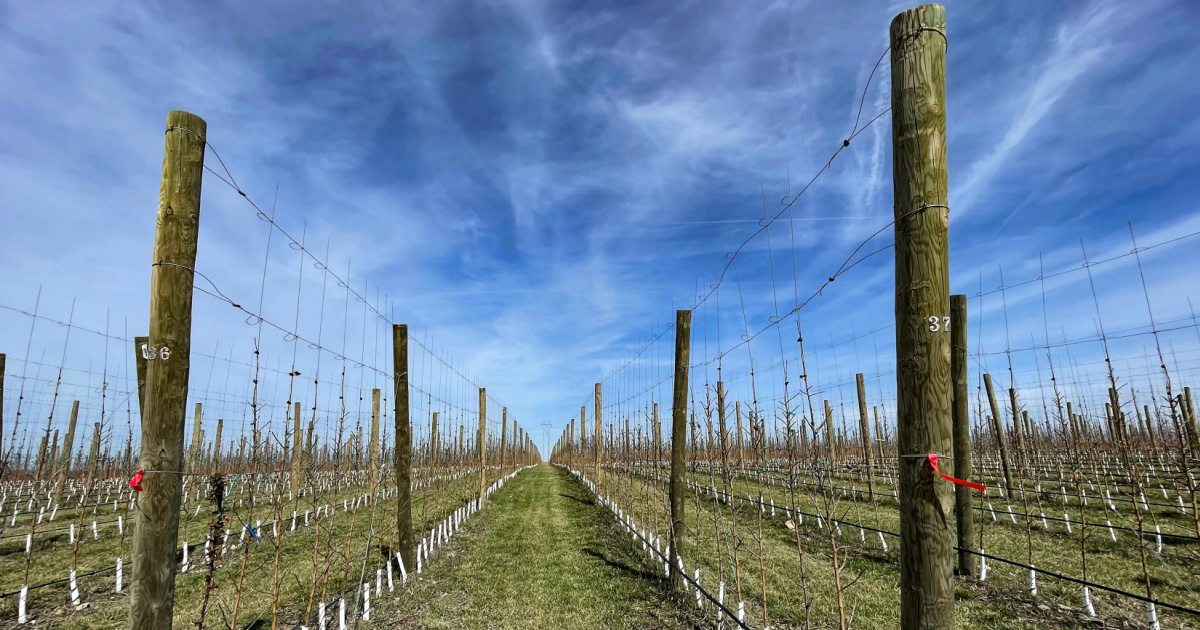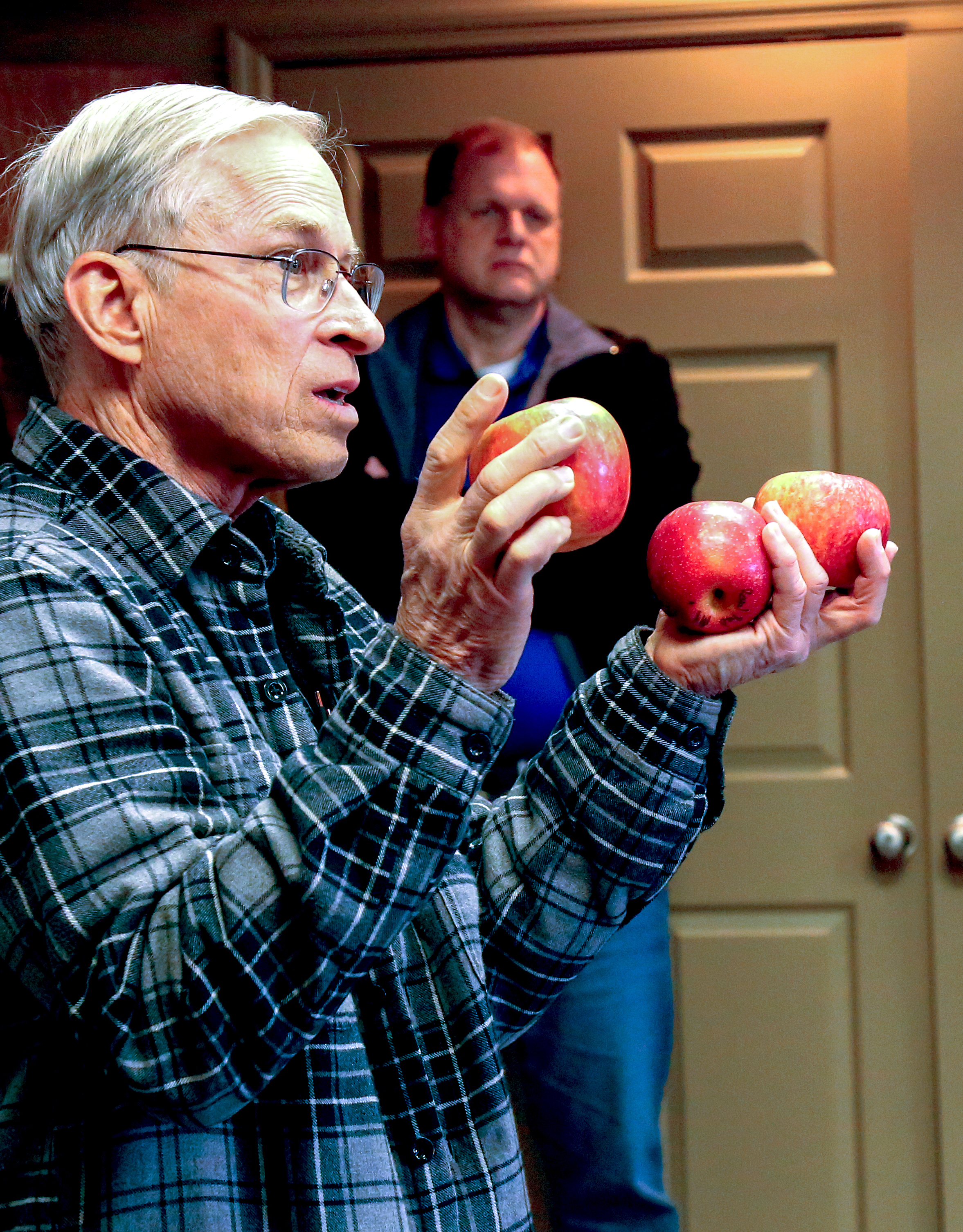Mining for Apples
Posted on Apr 11, 2023
What was once a surface mine providing valuable coal is now an apple orchard providing valuable produce and more.
In an area of the state known more for its storied coal industry than agriculture, a group of former coal miners have taken a reclaimed surface mine and turned it into the largest apple orchard in Kentucky.
With the unique name “AppleAtcha Agritech,” the Booth Energy Company (BEC) is creating an apple mecca that has the potential to not only move one of the world’s most popular fruits to a large portion of the country’s population but to help revitalize this area in Eastern Kentucky.
Ryan Wilson, manager of the orchard and BEC general manager said there is more to the orchard than just growing apple trees.
“We were looking for a way to repurpose this surface mine land that we have here, and because we're no longer in the coal industry, we are trying to find something to revitalize our economy around here and to provide jobs,” he said.
In going from the mining industry into agriculture, Wilson said there has been a lot to learn about growing apples but, in working with various partners including Bruce Rasch, from Apple Quest, and other experts in the sector, the trees are coming along nicely.
“I'm not from an agriculture background and have been in mining my whole career,” he said. “So, we've done a lot of learning, and have discovered innovative ways to overcome challenges to make the land plantable, and to be able to run our equipment through.”
One of those challenges has been the rocky terrain that lies beneath the surface of the soil. It has been the company’s mine experts who have used their experience with advanced mining equipment to develop ways to remove or crush the rocks and make this land suitable for the apple trees.
“As far as repurposing equipment that we had, we’ve found new ways to make techniques better and we’re able to maintain our equipment,” Wilson said. “When we were drilling the holes for the posts (that help support the apple trees), we'd have to take our drill bits into the shop and rebuild them at lunchtime every day because the ground was so abrasive. So, having the people to do that work was nice for us.”
Wilson added that they have worked with many partners to make this happen including an orchard in Michigan and extension specialists here to gain as much knowledge as they can when it comes to the day-to-day operations of the orchard.
 One such expert the team is consulting with is retired University of Kentucky College of Agriculture, Food and Environment extension fruit and vegetable specialist John Strang.
One such expert the team is consulting with is retired University of Kentucky College of Agriculture, Food and Environment extension fruit and vegetable specialist John Strang.
He said the initial planting on 60 acres with over 120,000 trees was surprising and is quite the undertaking, but apple orchards have a history in Eastern Kentucky.
“Years ago, we had quite an apple industry here and there were many small orchards around the state,” Strang said. “I've worked with the fruit industry for 42 years and this (AppleAtcha Agritech) is on the cutting edge of my knowledge. They have a high soil pH, which is an advantage and a natural, on-site water supply, all things that work in their favor.”
Another advantage of this orchard is its elevation which is over 1,100 feet above sea level, giving good air drainage and protection from frost, according to Strang.
“This is a high-density orchard with trees planted 21 inches apart, with ten-feet between rows. They are only growing the ‘Honeycrisp’ variety which is a little unusual for Kentucky. When talking about expected production we always talk about a thousand bushels per acre. These should be up above that.”
While there are so many things to learn from this particular orchard, Strang said as with most types of orchard production, it’s just a wait-and-see thing.
“You can have good years and bad years, and hopefully they'll have a lot of good years up here,” he said. “It's an impressive orchard and something we don't see anywhere else in Kentucky so, this was a good learning experience for other growers.”
For the owners of AppleAtcha Agritech, these 60 acres are just the beginning. They have plans to expand in the future and create on-site cold storage and packing facilities.
“We anticipate having some fruit on these trees in 2024 and then probably near full production by 2025,” Wilson said. “We are within a day’s drive of half the U.S. population from Eastern Kentucky and we want to send our apples out everywhere.”
In addition to the commercial production aspect of the orchard, Wilson said part of the plan is to help other producers while making an economic impact in the area.
“That's the whole goal behind this project is to be an impact for our region to make things better for our communities,” he said. “We are working with the non-profit group Community at the Core to help provide training for individual families who want to grow orchards.”
This group was founded by NFL star Bernie Kosar to, “Help communities being affected by a declining coal industry through agricultural education, training, and other positive efforts to reinvigorate the vital Appalachian region,” according to information from the Community at the Core website. Kosar is one of the AppleAtcha Agritech partners.
A group from Kentucky Farm Bureau (KFB) that included other orchard producers along with members of the Kentucky Horticulture Council recently toured the Eastern Kentucky orchard to get a firsthand look at this innovative approach to apple production in this Appalachian region.
KFB President Mark Haney led the group and said the kind of innovation seen at AppleAtcha Agritech can be valuable to other producers across the state.
"We were very impressed with this orchard and the impact it will have not only in the agricultural industry of Eastern Kentucky but as a huge economic boost," he said. "We can learn so much from projects like this and when working together, the ag industry across the state will benefit."
Renee Carrico, KFB Commodity Division Director, said this is a good example of utilizing the available resources to continually benefit communities in the area.
“What was once a surface mine that provided valuable coal to the region is now an orchard that will commercially produce apples for consumers throughout the country while providing jobs to the local economy,” she said. “It is a win-win situation.”
Comments